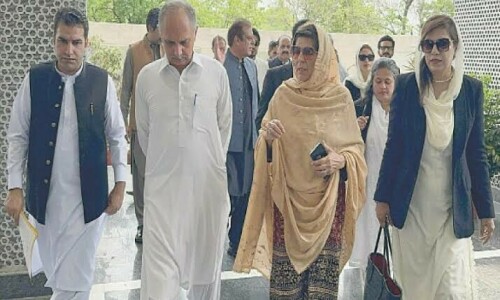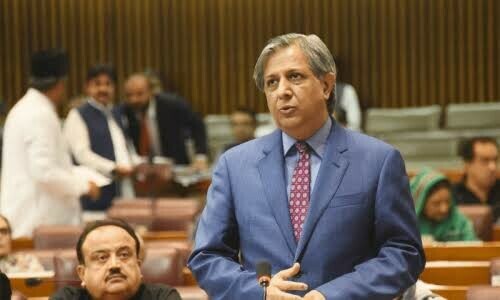ALL may not be well in relations between Pakistan and Afghanistan. Consider the recent verbal sparring between officials of the two countries. Last week, the Afghan deputy foreign minister accused Islamabad of “receiving millions of dollars” from the US to permit American drones to fly over Pakistan’s airspace for operations in Afghanistan. This remark by Sher Abbas Stanekzai was evidently in response to Prime Minister Shehbaz Sharif’s UN General Assembly address, in which he said Pakistan shared the concern of the international community about terrorist groups operating from Afghanistan’s soil. The Afghan minister’s allegation prompted a predictable retort from the Foreign Office spokesman who called it “unacceptable” and against the spirit of friendly relations between two neighbours.
But it wasn’t just this verbal clash between them that suggested uneasiness in relations. The violent activities of the Tehreek-i-Taliban Pakistan continue to be a source of concern and frustration for Islamabad. There has been a spike in cross-border terror attacks by TTP since the Taliban’s assumption of power. Official expectations that a Taliban government would help Pakistan secure and stabilise its western border have not been met. The TTP continues to be based in Afghanistan and conducts attacks from there. Over 155 Pakistani security personnel have lost their lives in these attacks in the past year.
The latest quarterly report of the UN Secretary General on Afghanistan, submitted to the Security Council in September, referred to“the continuing presence and activities of foreign groups in Afghanistan and its border areas“. It also said “border tensions and security incidents” have continued along the country’s border with Pakistan. An earlier report by the UNSC’s Analytical Support and Sanctions Monitoring Team found that “TTP has arguably benefited the most of all the foreign extremist groups in Afghanistan from the Taliban takeover” and “conducted numerous attacks and operations in Pakistan.” The May report also said that as a stand-alone force, TTP “is estimated to consist of 3,000 to 4,000 armed fighters located along the east and southeast Afghanistan-Pakistan border areas”.
Stable ties with Afghanistan are a strategic compulsion but many problems stand in the way.
Pakistani officials have engaged in talks with the TTP in the hope that this would yield an agreement to end the armed group’s 14-year war on Pakistan. But talks broke down months ago when it became clear that an intransigent TTP’s demands were non-negotiable. They have not resumed since. Instead, Pakistan has had to undertake undeclared kinetic actions against TTP targets and figures in Afghanistan. This has involved the elimination of three top leaders of the militant group, according to informed sources. While this has provoked protests from Kabul, Pakistan is unlikely to cease such unannounced actions.
The country’s growing security concern is also focused on the re-emergence and concentration of the TTP in Swat. This seems to be an unintended consequence of permitting some members of the group to cross the border and resettle in the country under a misguided concession made to the TTP when talks were in progress. But the security situation in Swat, which has seen widespread anti-TTP protests by residents, has now obliged Pakistani law-enforcement agencies to take action against the militant organisation.
Beyond security concerns, Pakistani officials are disappointed by the Taliban’s inability to live up to its other promises, especially girls’ education and respect for basic human rights. For the first time, top officials have been speaking out publicly on the denial of education to girls and continued closure of secondary girls’ schools by Taliban authorities. In an interview last month to France24, Foreign Minister Bilawal Bhutto-Zardari said the Taliban had not fulfilled their commitment on girls’ education. Significantly, Prime Minister Sharif said in his UN address that Pakistan was working to encourage Kabul to show respect for the rights of Afghan girls and women to education and work. In July, a resolution was adopted unanimously by the UN Human Rights Council that expressed unwavering commitment to the full and equal human rights for women and girls in Afghanistan, including the right to education and freedom of movement. Such calls by the international community and Pakistan have not elicited a positive response from the Taliban government. Explanations by Taliban leaders that they need time to move on this and on other ‘social concessions’ appear to be little more than excuses.
The international community’s patience is also wearing thin on this and other issues. The UN’s deputy head in Afghanistan, Markus Potzel, told the Security Council on Sept 27, that the international community is running out of patience on engagement with the Taliban. He acknowledged some “positive developments in the past few months”, but stressed “they have been too few and too slow and they are outweighed by negatives”. He portrayed the “ban on secondary education for girls — unique in the world — and growing restrictions on women’s rights” as “signals that the Taliban are indifferent to more than 50 per cent of the population and are willing to risk international isolation”. He said the Taliban’s claim of establishing peace and stability was also eroding given the rise in security incidents — armed clashes, crime and terrorist attacks. He added that “the reported presence of Al Qaeda leader Al-Zawahiri in the heart of Kabul and the strike against him, as well as continued presence of other terrorist groups, have forced a questioning of the Taliban’s counterterrorism commitments, further deepening the trust gap with the international community”.
Apart from these growing doubts over the utility of engagement, international interest in Afghanistan has also been waning. By relapsing into its regressive past and not responding to the concerns of the global community the Taliban have themselves contributed to diminishing interest in engagement. Infighting and power struggles among the Taliban is a key factor behind Kabul’s inability to embark on a course correction and is complicating and retarding decision-making.
Pakistani officials play down differences with Kabul and point to the many areas of ongoing cooperation to indicate that relations remain “smooth” and “good”. But it is also a fact that for months there have been no ministerial visits by either side. Cooperative relations with Afghanistan are a strategic compulsion for Pakistan but that does not minimise the many problems that stand in the way of achieving this.
The writer is a former ambassador to the US, UK & UN.
Published in Dawn, October 8th, 2022











































